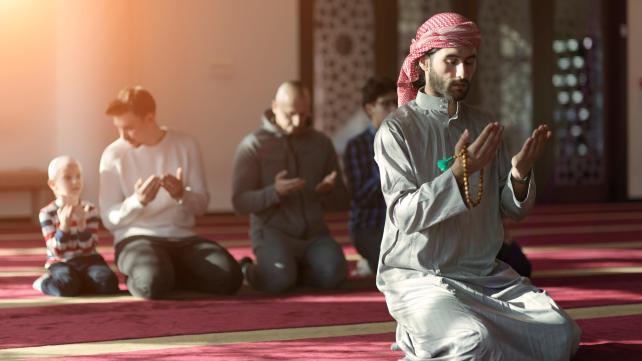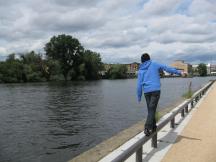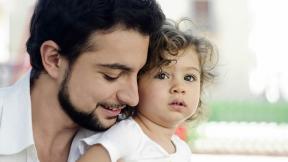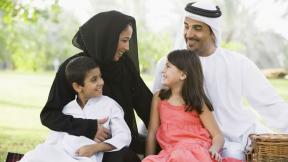
If you are a Muslim parent, chances are that you have experienced an embarrassing moment with one or more of your children at the masjid. Perhaps you took your toddler to Jummuah prayer, a community event, or a lecture. More than likely, you prepared thoroughly beforehand – speaking to your family about good manners in the masjid and modeling acceptable behavior, making sure to sit your children close to you, and bringing things along to keep them distracted. Yet, despite your best efforts to monitor them, your child ends up acting, well … like a child. Maybe they got up and wandered around, attempted to talk to you or their friends, or made some noise while playing. If your son or daughter was non-verbal at the time, their only crime may have been communicating their needs in the only way they knew how – by crying or whining. Whatever the offense was, more than likely you were met with judgmental stares, hisses, and/or an outright confrontation. These scenarios are all too common in our communities, but they are far from the teachings of Islam.
Situations in which a well-intentioned elder reprimands children or parents happen often in religious settings, but they are not always warranted or acceptable. Unfortunately, the chastisement may be abrupt and loud enough to catch the attention of other worshippers. The auntie or uncle may demand a parent escort their child outside or, worse yet, not bring them to the masjid at all. Depending on many factors, this exchange of words can escalate quickly and make parents and children feel uneasy. For Muslims in the West and everywhere in the world, the masjid is supposed to be a happy place – a space where we can feel welcomed and safe in a world that can be very cruel towards a Muslim minority.
Unfortunately, an altercation involving familial or child discrimination, can leave some families feeling so mortified or humiliated that they never return to the masjid again. Emptying our places of worship is the opposite of our goal and barring believers from worshipping freely is an act that is hated by Allah. Allah said in the Quran:
“Who does more wrong than those who prevent Allah’s Name from being mentioned in His places of worship and strive to destroy them?”
(Surah Al-Baqarah, 2:114)
Instead, we should be encouraging families to visit Allah’s House often, especially when they have young children. Rather than telling parents why they should not bring their babies to the masjid, we should remind ourselves about the Prophetic character when dealing with the youth. How did the Prophet Muhammad, peace and blessings, interact with children in the masjid? Answering this question will lead us to the conclusion that children, from infants to teens, have a right to be in the masjid and we should defend that right. They deserve to grow in the Islamic community, so their hearts are attached to it from a young age. The masjid should be their home away from home.
In case you and your children have ever felt unwelcomed in your local Islamic center, know that our beloved Prophet Muhammad, peace and blessings be upon him, not only tolerated, but normalized having young children in our houses of worship.
Lessons from the Sunnah
Here are some examples from the Prophetic tradition about babies and toddlers in the masjid:
1. The Prophet used to bring young children to the masjid.
There is no hadith or Quranic verse prohibiting children from entering places of worship. In fact, the Prophet Muhammad, peace and blessings be upon him, used to bring children into the masjid often. In an authentic hadith, it is narrated from Abdullah ibn Shidad, this his father, Shidad ibn al-Had (one of the companions), may Allah be pleased with him, said:
"The Messenger of Allah, peace and blessings be upon him, came out to us for one of the nighttime prayers, and he was carrying Hasan or Husain. The Messenger of Allah, peace and blessings be upon him, came forward and put him down, then he said the Takbir and started to pray. He prostrated during his prayer and made the prostration lengthy." My father said: "I raised my head and saw the child on the back of the Messenger of Allah, peace and blessings be upon him, while he was prostrating so I went back to my prostration. When he finished praying, the people said: "O Messenger of Allah, you prostrated during the prayer for so long that we thought that something had happened or that you were receiving a revelation.' He said: 'No such thing happened. But my son was riding on my back, and I did not like to disturb him until he had enough.'"
(An-Nasai)
Parents should not be shamed for entering the masjid with a toddler in tow because it was the practice of the Prophet, peace and blessings be upon him. Even after his grandchildren climbed and played on his back while he led the prayer, he did not bar them from being in the musalla nor did he reprimand them. He simply explained to his followers the reason for his prolonged prostration.
2. It was his practice to carry babies while he was praying.
Sometimes, mothers are criticized in the masjid because they choose to bring their infants or carry them while they pray. However, this was also a practice of the Prophet, peace and blessings be upon him. In another hadith, Abu Qatada, may Allah be pleased with him, narrated:
“Allah's Messenger, peace and blessings be upon him, was offering prayer while he was carrying Umama, the daughter of Zainab, when he prostrated, he put her down and when he stood up, he lifted her up.
(Bukhari, Muslim)
Reading these stories of how the Prophet, peace and blessings be upon him, interacted with infants and children are heartwarming and should make us think twice about how we judge our youngest generation of believers and the future of our ummah.
3. The Prophet was patient with children even if they wandered into the musalla.
Not only did the Prophet, peace and blessings be upon him, allow his grandchildren to play on his back while he was leading the prayer, but he also enjoined the congregation to be patient with them. These days, some congregants get annoyed when a child merely walks into the musalla, but the Prophet, peace and blessings be upon him, was compassionate towards children.
On one occasion, his grandchildren wandered into the masjid while he was delivering the khutbah. They were only toddlers at the time. Abu Buraydah reported:
The Messenger of Allah, peace and blessings be upon him, was delivering a sermon when Hasan and Hussein came wearing red shirts, walking, and tripping. The Prophet descended from the pulpit, picked them both up, and placed them in his lap. The Prophet said:
“Allah spoke the truth when He said: Verily, your wealth and your children are only a trial for you (64:15). I looked at these two boys walking, and tripping and I could not be patient, even I cut short my speech to pick them up.”
(At-Tirmidhi, Ibn Majah)
4. If a child cried, he never got upset.
The sound of a baby or toddler whimpering or crying in the masjid can irk even the most composed worshipper, but it never bothered the Prophet, peace and blessings be upon him. He taught his followers a valuable lesson about what to do in such situations. He once said:
“When I stand for prayer, I intend to prolong it, but on hearing the cries of a child, I cut it short, as I dislike troubling the child's mother.'"
(Bukhari)
The Prophet, peace and blessings be upon him, was always considerate of others and he taught his followers to be empathetic. Yet, it seems we have strayed far from his teachings when instead of the imam shortening his prayer, a mother is forced to stop her prayer and escort her baby out of the masjid. Prophet Muhammad gave us all a stern warning when he said:
“He does not belong to us who does not show mercy to our young and honor our old.” (At-Tirmidhi)
Some people may argue that a woman is not obligated to pray in the masjid, and thus, she should pray with her child at home. However, it is her right to be there. Ibn Umar reported that the Messenger of Allah, peace and blessings be upon him, said:
Do not prevent women from their share of the mosques, if they seek your permission.”
(Bukhari, Muslim)
It may be that this mother is struggling in her faith, and she needs to feel the warmth of the House of Allah and surround herself with other believers. She may also be hoping to get her baby used to being in the masjid, so he/she may grow up in the Islamic community. Rather than scold her or her baby, lend a hand and make her feel comfortable, so that she may finish her prayer. Abu Hurayrah, may Allah be pleased with him, reported that the Prophet, peace and blessings be upon him, said:
"Anyone who relieves a hardship for a believer in this world, Allah will relieve one of his hardships on the Day of Resurrection. Anyone who makes things easy for a hard-pressed person, Allah will make things easy for him in this world and in the Hereafter. Anyone who covers up the faults and sins of a Muslim, Allah will cover up his faults and sins in this world and in the Hereafter. Allah supports His slave as long as the slave supports his brother.”
(Muslim)
5. There is no discrimination when it comes to children (or anyone).
Sadly, our masajid are not free of discrimination in its many ugly forms – be it because of age, gender, marital status, nationality, or race. It may be that some children’s disruptions are overlooked while others are specifically targeted due to the color of their skin or their family background. Stereotypes, lack of knowledge of Prophetic teachings, ignorance about other cultures, and/or low to no emotional intelligence drives individuals to harass Muslims who may be different from them.
There may be situations in which a family is discouraged to bring their young children to the masjid because they are deemed more “prone to misbehavior” or they could be “bad influences” for other children. This type of prejudice has no place in the masjid or in Islam. Allah says in the Quran:
“O mankind, indeed, We have created you from male and female, and have made you into nations and tribes, that you may know one another. Indeed, the most honored of you in the sight of Allah is the most righteous. Indeed, Allah is Knowing and Acquainted"
(Surah Al-Hujurat, 49:13)
The Prophet, peace and blessings be upon him, echoed this sentiment and was very vocal against injustice of any kind. In one hadith, he said:
“Fear Allah and treat your children [small or grown] fairly (with equal justice).”
(Bukhari, Muslim)
The Bottom Line
Some contemporary scholars were asked regarding the permissibility of bringing young children to the masjid and their response was the following:
“(Children) may accompany their fathers or their mothers to the mosque, if there is fear for them [if they are left at home]; there is nothing wrong with that, because that was done at the time of the Prophet, peace and blessings be upon him… Those who have reached the age of seven or older should be told to do wudu and pray, so that they may get used to doing that and so that they and their parents may earn reward. There is nothing wrong with making them stand in the row and doing so does not create gaps in the row, because their prayer is valid and because the children used to stand in the rows with the adults behind the Prophet, peace and blessings be upon him.”
(Fataawa al-Lajnah ad-Daa’imah (Vol. 2, 6/337), Islamqa.org)
Our young children learn through observing and exploring their surroundings. We must teach them that the masajid are the Houses of Allah, the Muslim places of worship, and a haven for their family. To do that, they must familiarize themselves with this wonderful place and form bonds with their fellow believers. How will they achieve that if they find nothing but hostility in the very place which their parents describe as a place of refuge? This sends mixed signals to the child and causes confusion in their developing psyches. Our role, whether we are a parent or not, is to treat this issue with hikmah – wisdom. We must work together to make the masajid more inviting to families, and the way to do so is by practicing the Sunnah when it comes to dealing with children in the masjid.
Wendy Díaz is a Puerto Rican Muslim writer, award-winning poet, translator, and mother of six (ages ranging from infant to teen). She is the co-founder of Hablamos Islam, a non-profit organization that produces educational resources about Islam in Spanish (hablamosislam.org). She has written, illustrated, and published over a dozen children’s books and currently lives with her family in Maryland. Follow Wendy Díaz on social media @authorwendydiaz and @hablamosislam.








Comments
Please be kind to your fellow adults
https://www.soundvision.com/article/why-you-should-bring-your-children-to-the-masjid
Wendy, you write: "Yet, despite your best efforts to monitor them, your child ends up acting, well … like a child. Maybe they got up and wandered around, attempted to talk to you or their friends, or made some noise while playing. If your son or daughter was non-verbal at the time, their only crime may have been communicating their needs in the only way they knew how – by crying or whining. Whatever the offense was, more than likely you were met with judgmental stares, hisses, and/or an outright confrontation."
Please understand that here, you are making the child's right to be a child, greater than the other adults' obligation in the house of worship. The adults are there to pray, on pain of losing their goodness in this life, and then dreadful torments in the next life. The child will always be a guest.
You also use horrible words to frame your co-religionists as mere bodies that deserve no human aspects. They are "judgmental", they "stare" as if they have the evil eye (not that they are chastely avoiding speaking when speaking is forbidden), and they "hiss". And any attempt to reassert their own rights / obligations, is "confrontation".
You even try to use the Quran against your co-religionists, by using a verse which condemns non-Muslims who prevent Muslims from worshipping. Yep, you virtually made takfir. You didn't even completely quote the verse, here's the verse in full, and you'll see that if anything, it shows we must be respectful of a place of worship and act fearful of violating that place of worship (in fact the verse may only be referring to one of the official sanctuaries, i.e. the Ka'aba?):
2:114 "And who doth greater wrong than he who forbiddeth the approach to the sanctuaries of Allah lest His name should be mentioned therein, and striveth for their ruin. As for such, it was never meant that they should enter them except in fear. Theirs in the world is ignominy and theirs in the Hereafter is an awful doom."
You are saying your fellow adult worshippers are striving for the ruin of their own mosque / the Ka'aba even, and you deliberately withheld the rest of the verse about entering in a state of fear (i.e. deep respect of the sanctity of the place), and then the part about how they'll all go to hell!
Why are you saying this? Because they felt disturbed by a child crying and violating the sanctity of the place? Is that really all it took for you to condemn your fellows? And the verse you quoted even supports them.
In Part 1 you then quote a hadith from An Nasa'i about how the Prophet (peace be upon him) prolonged a prostration because one of his grandsons was sat on his back. What you are missing is: the Prophet was leading the prayer, any actions he took, were part of his leading the prayer. He was naturally welcoming of his own grandsons, it wasn't a stranger coming up to him and sitting on him. It was the Prophet responding to his own kids, and he was leading the prayer so he was not disturbing the imam, he was the imam. Moreover, there was no mention of his grandson drowning out his voice.
This is not justification for other people's kids drowning out the imam's voice and for running around people while they pray. Even if kids are encouraged to attend a place of worship, that's not the same as them attending the prayer, and taking over the prayer by running around and yelling during the prayer. Prayers happen in a place of worship, but the place of worship isn't constantly at prayer. Maybe kids can visit, but when it's prayer time, maybe they should not create barriers to worship.
The Quran tells us several times to not be tempted by our wealth and children i.e. not be carried away by making these things supreme in our lives, such that they overrule the central aim of the worshipper in this life: worshipping God.
Here you go:
8:28 And know that your possessions and your children are a test, and that with Allah is immense reward.
34:37 And it is not your wealth nor your children that will bring you near unto Us, but he who believeth and doeth good (he draweth near)
60:3 Your ties of kindred and your children will avail you naught upon the Day of Resurrection. He will part you. Allah is Seer of what ye do.
63:9 O ye who believe! Let not your wealth nor your children distract you from remembrance of Allah. Those who do so, they are the losers.
64:14 O ye who believe! Lo! among your wives and your children there are enemies for you, therefor beware of them. And if ye efface and overlook and forgive, then lo! Allah is Forgiving, Merciful.
64:15 Your wealth and your children are only a temptation, whereas Allah! with Him is an immense reward.
Then in Part 2 you quote a hadith from Bukhari and Muslim about the Prophet carrying another toddler on his back during prayer, this was Umama, who would have been his graddaughter. This was the Prophet dealing with his own family while he was imam, and again, there's no evidence that the kid was yelling her head off nor that the kid was running around jumping on other people during their prayer.
Then in Part 3 you quote a hadith (in At Tirmizi and Ibn Majah) about the Prophet picking up Hasan and Hussein whilst he was in the pulpit, presumably while he was giving a Khutbah as imam. The Prophet explained himself by quoting Qur'an 64:15 (quoted above too). It seems to me to be supporting the view that non-worshippers, i.e. toddlers, should NOT be getting in the way of worshippers during worship, and that to permit this happening, to permit this affecting others, is to be tempted away from the worship at hand, by one's love for one's own household, one's own kids, at the expense of everyone and everything else. Yet you seem to think this is saying the opposite, that it's alright for toddlers to get in the way of worshippers worshipping?
Then in Part 4 you quote a hadith from Bukhari about how the Prophet - in his prerogative as imam - cuts short prayers if a baby is crying, because he doesn't want to trouble the mommy. Maybe the baby's crying wasn't loud enough to disturb others. Maybe the mommy was troubled in the sense that the crying was, you know, interrupting her prayer and the crying meant the baby needed urgent attention. It's worth noting that the Prophet did NOT cut short the prayer for the sake of the baby.
Later in Part 4 you quote a hadith from At Tirmizi that says who doesn't show mercy to our young and honour our old, doesn't belong as one of us. Your use of this hadith could potentially be making takfir (which you seem really lax about, along with toddlers screaming the mosque down during prayers). The hadith doesn't specifically refer to kids interrupting random worshippers during prayer, and also, showing mercy isn't the same as permitting the kids to block their worship. Also, honouring the old might amount to permitting them to worship in peace, you know?
Later in Part 4 you try to link this with women's suffrage, and the need of one woman who is feeling a bit woozy. So, perhaps this justifes, you know, her kids, you know, screaming the place down while everyone else is trying to get through the prayer as they were ordered by God to worship him? All hail the Woozy Woman.
Later in Part 4 you even quote a hadith from Muslim, about the virtue of easing another believer's hardship in this world, making the life of the hard-pressed person easier, and covering their faults and sins. Yet you have no qualms about causing problems for hard pressed worshippers and faulting them for wanting to worship in peace.
Then in Part 5 you go so far as to make the right of a worshipper to worship in peace, to be discrimination? Or have l misread you? Then you even bring racism into it because, well, l don't know. Then you quote some random modern authority that says some ruling without any working out, any explanation. It mentions one interesting thing though: that there may be fear in leaving children and their mothers at home.
Again and again you forget this:
1. The early years of Islam were a time of great fear, a person's family were liable to violence if they were left alone at home, so it was very often best that they should be with daddy in the mosque while daddy was there too .
2. The Prophet was imam in all the cases you quoted in hadith, and thus he was in the lead. Whatever actions he took were his prerogative as imam leading the prayer. He wasn't being led by a toddler, even if it seemed that way. He was always leading the prayer and the toddler climbing onto his back or being carried by him was a grandson or granddaughter in each case. It is not the same as random people's kids affecting random worshippers, and somewhere in the background, the imam is trying to be heard.
Actually last Friday there
Actually last Friday there was an instant where children annoyed during Khutba and Juma'h salah .then after the Salah the Imam said not to bring children below 7yrs to Masjid. Jazakallahu khayr
Actually last Friday there
Actually last Friday there was an instant where children annoyed during Khutba and Juma'h salah .then after the Salah the Imam said not to bring children below 7yrs to Masjid. Jazakallahu khayr
Children to the mosque
Thanks so much for clarify my doubt
Location
Add new comment